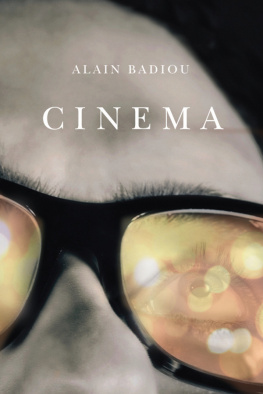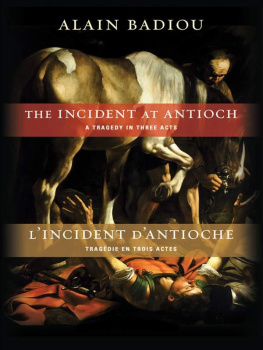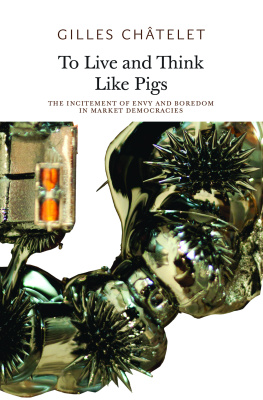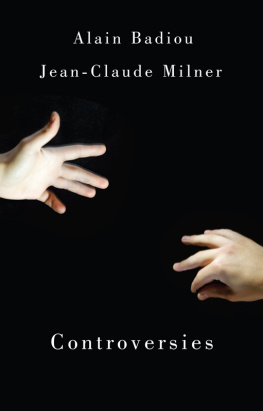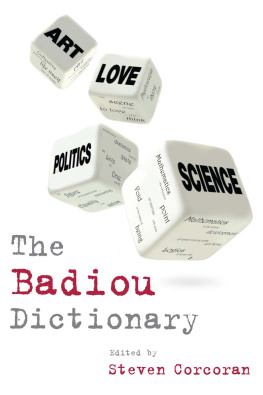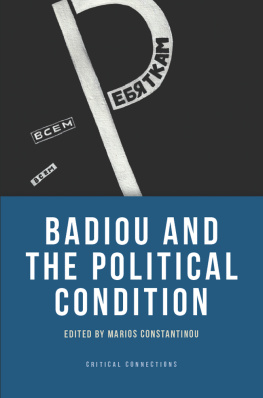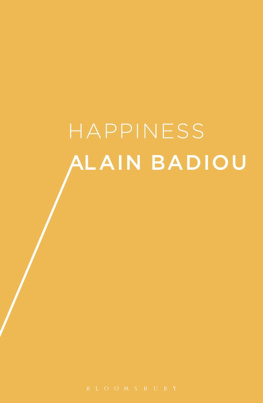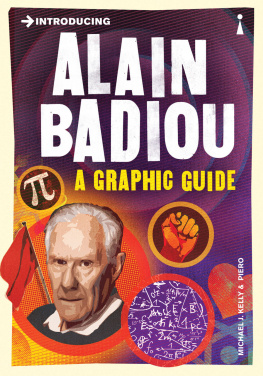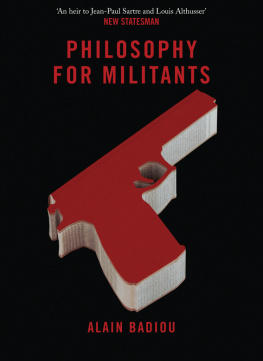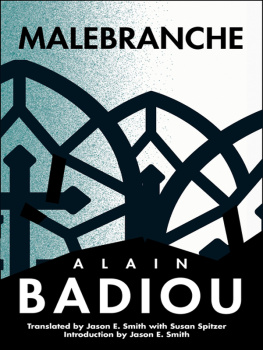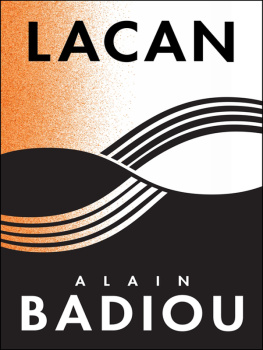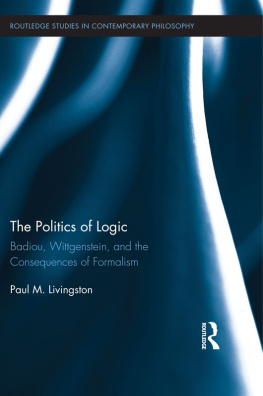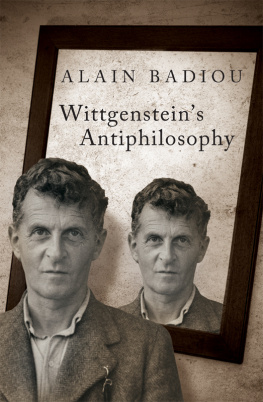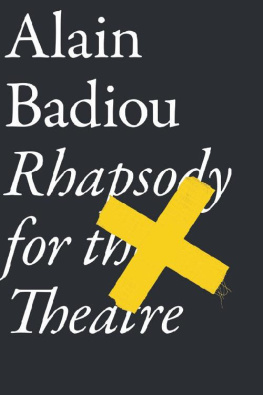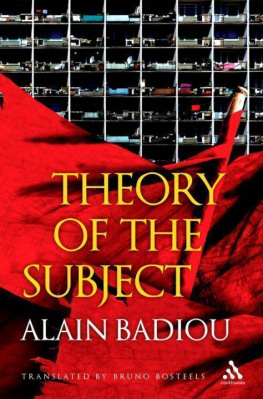Badiou Alain - Cinema
Here you can read online Badiou Alain - Cinema full text of the book (entire story) in english for free. Download pdf and epub, get meaning, cover and reviews about this ebook. City: Cambridge, year: 2013, publisher: Wiley;Polity Press, genre: Religion. Description of the work, (preface) as well as reviews are available. Best literature library LitArk.com created for fans of good reading and offers a wide selection of genres:
Romance novel
Science fiction
Adventure
Detective
Science
History
Home and family
Prose
Art
Politics
Computer
Non-fiction
Religion
Business
Children
Humor
Choose a favorite category and find really read worthwhile books. Enjoy immersion in the world of imagination, feel the emotions of the characters or learn something new for yourself, make an fascinating discovery.
- Book:Cinema
- Author:
- Publisher:Wiley;Polity Press
- Genre:
- Year:2013
- City:Cambridge
- Rating:4 / 5
- Favourites:Add to favourites
- Your mark:
- 80
- 1
- 2
- 3
- 4
- 5
Cinema: summary, description and annotation
We offer to read an annotation, description, summary or preface (depends on what the author of the book "Cinema" wrote himself). If you haven't found the necessary information about the book — write in the comments, we will try to find it.
Cinema — read online for free the complete book (whole text) full work
Below is the text of the book, divided by pages. System saving the place of the last page read, allows you to conveniently read the book "Cinema" online for free, without having to search again every time where you left off. Put a bookmark, and you can go to the page where you finished reading at any time.
Font size:
Interval:
Bookmark:

To my friends from LArt du cinma, and to my son, Andr Balso-Badiou, in particular.
First published in French as Cinma Nova Editions, 2010
This English translation Polity Press, 2013
Polity Press
65 Bridge Street
Cambridge CB2 1UR, UK
Polity Press
350 Main Street
Malden, MA 02148, USA
All rights reserved. Except for the quotation of short passages for the purpose of criticism and review, no part of this publication may be reproduced, stored in a retrieval system, or transmitted, in any form or by any means, electronic, mechanical, photocopying, recording or otherwise, without the prior permission of the publisher.
ISBN-13: 978-0-7456-5567-3 (hardback)
ISBN-13: 978-0-7456-5568-0 (paperback)
ISBN-13: 978-0-7456-7002-7 (Multi-user ebook)
ISBN-13: 978-0-7456-7003-4 (Single-user ebook)
A catalogue record for this book is available from the British Library.
For permissions, please see Acknowledgments page.
The publisher has used its best endeavors to ensure that the URLs for external websites referred to in this book are correct and active at the time of going to press. However, the publisher has no responsibility for the websites and can make no guarantee that a site will remain live or that the content is or will remain appropriate.
Every effort has been made to trace all copyright holders, but if any have been inadvertently overlooked the publisher will be pleased to include any necessary credits in any subsequent reprint or edition.
For further information on Polity, visit our website: www.politybooks.com
ACKNOWLEDGMENTS
Chapter 14 is an excerpt from Bruno Bosteels translation Rhapsody for the Theatre: A Short Philosophical Treatise, in Theatre Survey , 49: 2 (2008), pp. 187238. Copyright American Society for Theatre Research, and reproduced with permission of Cambridge University Press.
Chapters 15 and 16, with slight modifications, are from The False Movements of Cinema, in Alain Badiou, Handbook of Inaesthetics, trans. Alberto Toscano, pp. 7888. Copyright 2005 by the Board of Trustees of the Leland Stanford Jr. University for the translation. All rights reserved. Reproduced with the permission of Stanford University Press.
Chapter 21 was translated as Philosophy and Cinema, in Alain Badiou, Infinite Thought: Truth and the Return to Philosophy , eds. and trans. Oliver Feltham and Justin Clemens (London and New York: Continuum, 2005), pp. 8395. The slightly revised translation is reprinted with the kind permission of Bloomsbury Publishing Plc.
Chapter 26, with minor revisions, is Alberto Toscanos translation Dialectics of the Fable, in Science Fiction Film and Television 1: 1 (2008), pp. 1523, Liverpool University Press.
FOREWORD
Cinema is a Thinking Whose Products are the Real
For Alain Badiou, cinema is an education, an art of living, and a thinking. He has written of his relationship with the seventh art in about thirty different texts, dating from the late 1950s to the present. This in itself amounts to a comprehensive vision and interpretation of cinema, even if most of these articles deal with individual films or groups thereof. Such an approach is in fact one of the characteristic features of Badious thought: thinking on a case-by-case basis, deriving a whole system from one particular work of art considered in its specificity. As a result, these texts offer a wide-ranging survey of the cinema of the past fifty years, from filmmakers of modernity (Murnau, Antonioni, Oliveira, Tati, Godard) to a few contemporary American films ( The Matrix , Magnolia , A Perfect World ), by way of a few unique experiments (Guy Debord, the cinema of 68, the militant films of the Groupe Foudre, and so on).
Like quite a few thinkers of his generation (Rancire, Genette, and Deleuze, for example), Alain Badiou was brought up from an early age on the cinema as a vector of thought. His cinephilia was boundless, and he turned to writing about it right from his student days, when he contributed to Vin nouveau , the journal of young leftist Catholics at the cole Normale Suprieure, in 1957. Beginning with his ambitious, important first text, Cinematic Culture, a few specific ideas emerged that would run throughout his subsequent work: cinema does justice to the human figure inscribed in the contemporary world; cinema considered in terms of its subjugating relationship with the other arts; cinema as an imaginary voyage and a thinking of the Other. With his turn to militant commitment and a political philosophy, Badiou pursued his critical work, contributing to La Feuille foudre and LImparnassien in the 1970s and early 1980s. The latter were militant journals in which a judgment was issued, the judgment of a political tribunal of sorts. The verdict would come down: such-and-such a film was revisionist, or such-and-such films merited more respect and consideration. In the line of fire were the French leftist fiction films, while among the few filmmakers admired enough to be spared the sentence were Bresson and Godard.
In 1981, along with Natacha Michel, Badiou founded the biweekly journal Le Perroquet , the intellectual core of anti-Mitterrandism, and for ten years staked out an altogether remarkable critical itinerary in a number of articles he wrote about films of interest to him. Some highly stimulating analyses of the features of the French comedy film, the filmmakers of the second modernity (Godard time and again), and Swiss cinema as the emblem of cinematic neutrality are also worth noting.
These were followed by more extensive, theoretical texts, published over the past fifteen years in the journal LArt du cinma as a rule and written in clear, simple language one of the hallmarks of Badious philosophical writing style on the dialectics of the fable, film as a philosophical machine, and cinema as a democratic emblem. In these essays, the philosopher develops the idea of cinema as a producer of a truth of the contemporary world and of film as a sensible configuration of the truth of the world. Films think, and it is the task of the philosopher to see them and transcribe that thinking: What is the subject to which the film gives expressive form? This is the question at the root of Badious thinking about cinema. In many of these texts, cinema becomes an impure art cannibalizing its times, the other arts, and people a major art precisely because it is the locus of the indiscernibility between art and non-art. It is all this, explains Alain Badiou in a clear and irrefutable way, that makes cinema the social and political art par excellence, the best indicator of a civilization, as were Greek tragedy, the bildungsroman, and the operetta in their respective eras. Last but not least, included in this book is the text of a seminar given by Alain Badiou in Buenos Aires in 2003, Cinema as Philosophical Experimentation, in which he develops his thinking of cinema at length and in great detail, illustrating it with many new examples from Mizoguchi, Ozu, Rossellini, Visconti, Hitchcock, Godard, Lang, Hawks, and Anthony Mann. This text can be read as a veritable manifesto of cinema as conceived by Alain Badiou.
Antoine de Baecque
CINEMA HAS GIVEN ME SO MUCH
An Interview with Alain Badiou by Antoine de Baecque
The first thing that struck me when I was assembling all your texts on cinema for this volume is how spread out over time they are, as if the cinema had accompanied you throughout your entire intellectual life. The last text, on Clint Eastwood, dates from 2010; the first, Cinematic Culture, was published in June 1957 in the journal Vin nouveau, when you were twenty years old . Cinema would seem to be a very important art in your education .
Font size:
Interval:
Bookmark:
Similar books «Cinema»
Look at similar books to Cinema. We have selected literature similar in name and meaning in the hope of providing readers with more options to find new, interesting, not yet read works.
Discussion, reviews of the book Cinema and just readers' own opinions. Leave your comments, write what you think about the work, its meaning or the main characters. Specify what exactly you liked and what you didn't like, and why you think so.

